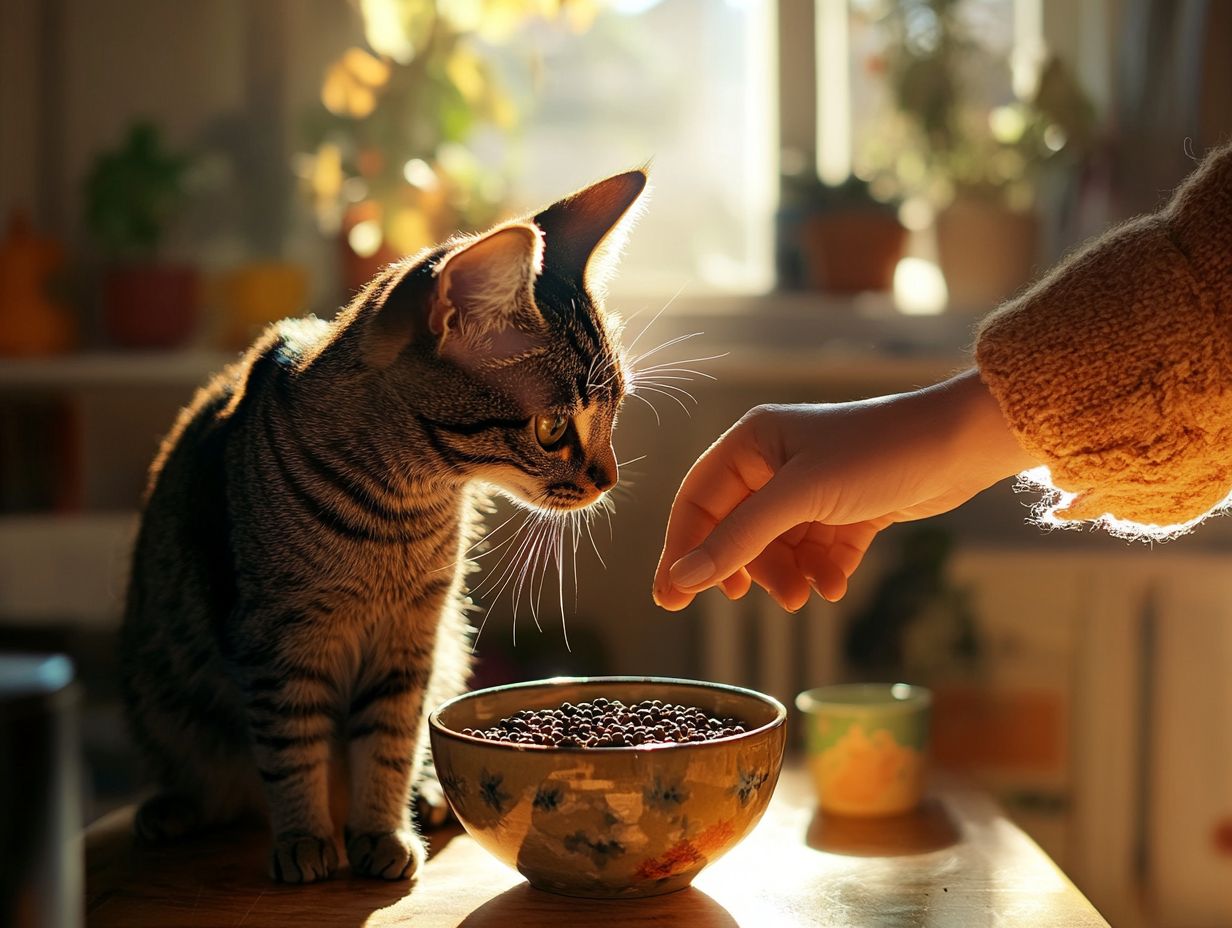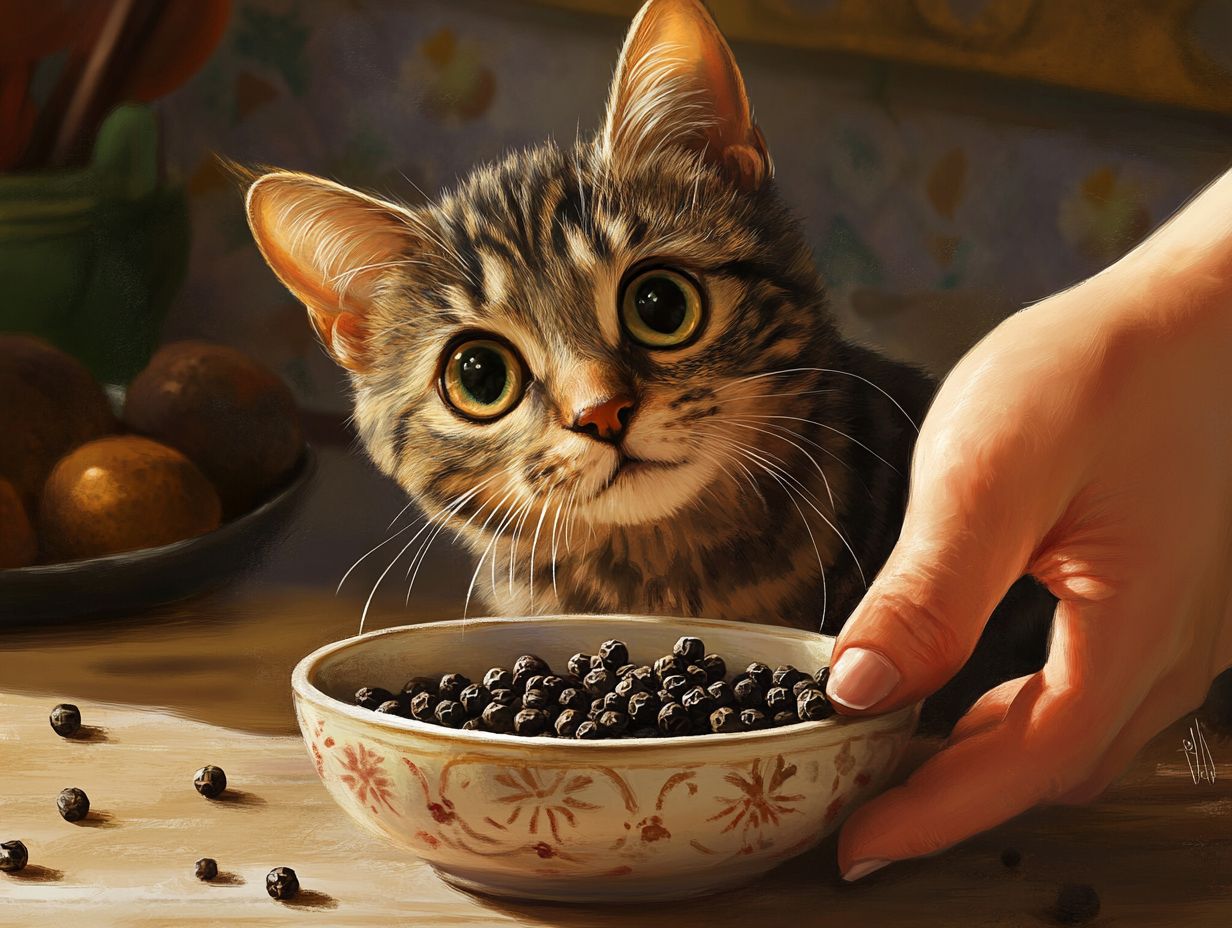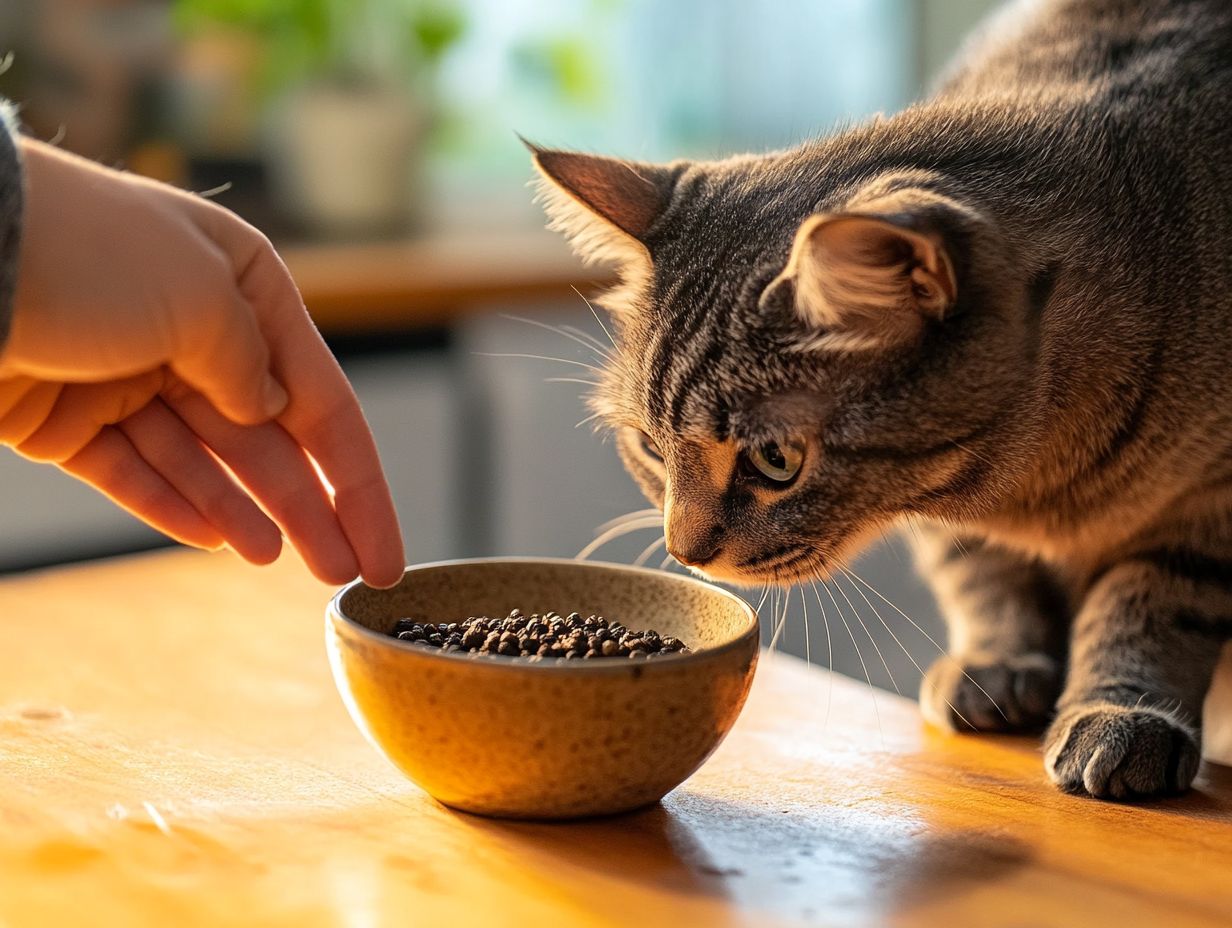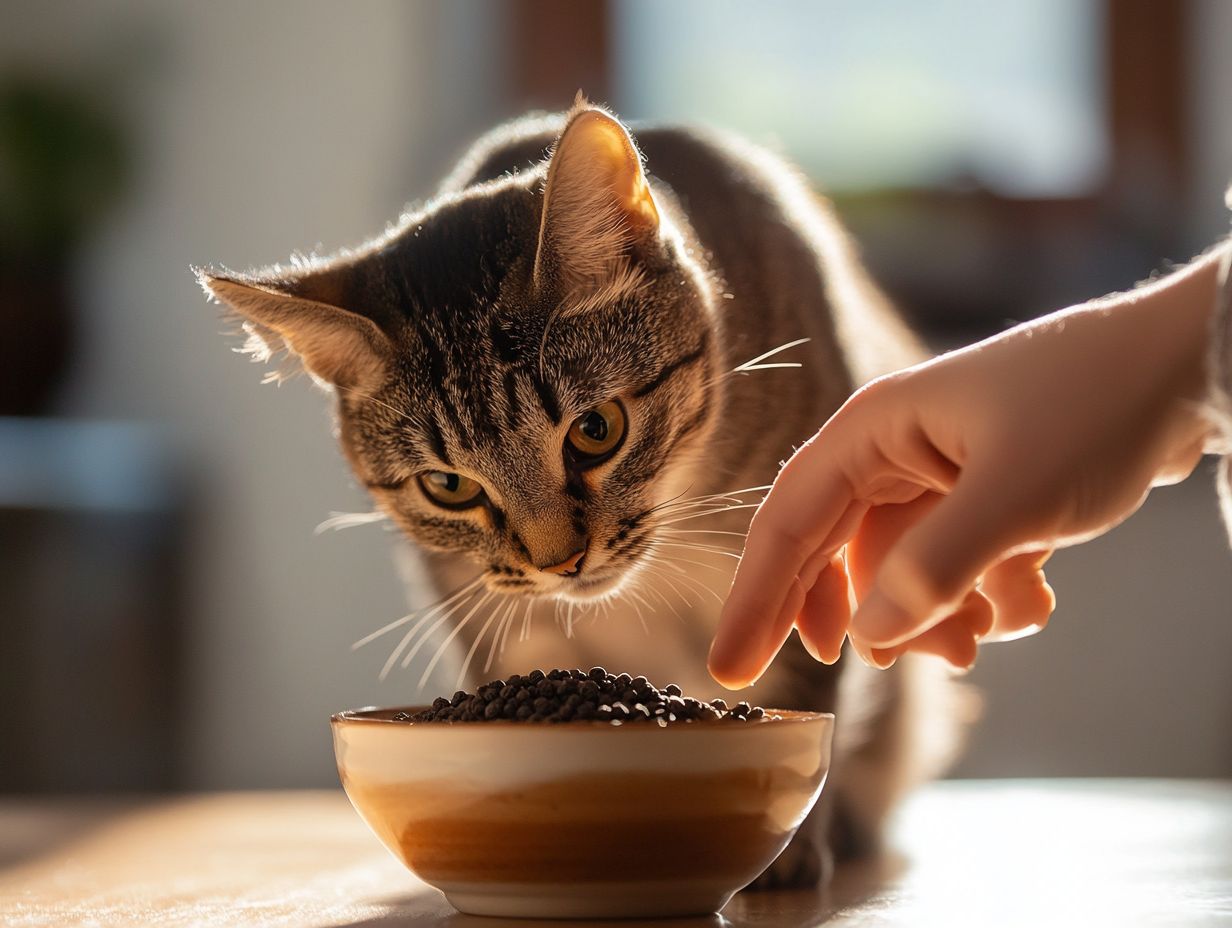Are you curious about whether cats can eat black pepper? Understanding the dietary needs of our feline friends is crucial for their health. While spices can enhance flavor, many pet owners are unsure which ones are safe for cats. This article delves into the role of spices in a cat’s diet, including black pepper and its potential health effects. We will also identify other spices to avoid and suggest safe alternatives that can make your cat’s meals both tasty and healthy!
Key Takeaways:

- Cats have specific nutritional needs, so introducing any spices, including black pepper, should be done cautiously.
- Black pepper may have negative effects on a cat’s health, such as upset stomach and irritation in the mouth and throat.
- Other spices that can be harmful to cats include onion, garlic, and cinnamon, which should be avoided.
- If your cat accidentally ingests black pepper, monitor them closely and consult a veterinarian if symptoms occur.
The Role of Spices in a Cat’s Diet
Spices can add flavor to food preparations but should be used sparingly in a cat’s diet. Understanding the impacts of adding spices, like black pepper, is essential, as not all are safe for feline consumption.
This caution applies to both food and traditional medicine. While spices have been used for centuries, it’s vital for pet owners to be aware of their effects on cats.
Understanding a Cat’s Nutritional Needs
A cat’s nutritional needs are essential for their overall health and well-being. Their dietary requirements differ significantly from those of humans, highlighting the importance of understanding the fundamental components of their diet. For more detailed information, see this article on whether cats can eat black pepper and its potential risks.
Cats thrive on a high-protein diet, which supplies the amino acids necessary for muscle development and energy. Quality protein is vital for nurturing a healthy and strong cat. Fats are also important as they provide concentrated energy and promote healthy skin and coat.
Various vitamins and minerals support bodily functions and a robust immune system. Deficiencies in these nutrients can lead to serious consequences, including diminished immunity and organ dysfunction. Pet owners should consult veterinarians to develop a balanced diet for their cats.
Safe herbs like catnip and cat thyme can improve a cat’s quality of life and dietary experience.
Can Cats Eat Black Pepper?
Black pepper, or Piper nigrum, raises concerns among pet owners and veterinarians. Cats are strict meat eaters with digestive systems not designed to handle certain spices, including black pepper. The compound piperine in black pepper can pose risks, potentially causing respiratory irritation and gastrointestinal discomfort if ingested in large amounts.
Possible Effects on a Cat’s Health

The active component of black pepper, piperine, can lead to adverse reactions in many cats. Ingesting black pepper may result in various complications.
Respiratory issues can occur, with affected cats showing signs like sneezing, coughing, and difficulty breathing due to airway irritation. Gastrointestinal problems, including vomiting or diarrhea, may also arise if their digestive systems struggle to cope with this unsuitable ingredient. If your cat shows signs of distress after consuming black pepper, seek veterinary assistance immediately.
Conclusion
In summary, while spices can enhance flavor, they can also pose risks to our feline friends. It’s best to avoid adding black pepper to your cat’s food to prevent gastrointestinal issues. Always consult with a veterinarian before making dietary changes to ensure your cat’s health and safety.
Some cats might also experience excessive drooling or discomfort after consuming black pepper-seasoned foods. Therefore, pet owners should monitor their cats closely for any health risks or behavioral changes when introducing new foods containing black pepper.
Other Spices That May Be Harmful to Cats
In addition to black pepper, several spices and herbs can be detrimental to cats. Ingredients like garlic and onion are toxic and can cause severe health complications, including respiratory irritation and stomach upset.
Understanding which spices are harmful is crucial for safe feeding.
Common Spices to Avoid
Spices like garlic and onion are particularly dangerous for cats. For more information, refer to this article on Can Cats Eat Black Pepper? Is It Harmful?.
Nutmeg contains myristicin, which can cause hallucinations and seizures in pets. Additionally, cinnamon can irritate a cat’s gastrointestinal tract, particularly in large amounts, and mustard seeds may cause gastrointestinal discomfort.
Pet owners should remain vigilant, as these spices can be present in everyday foods and condiments. Consulting a veterinarian for specific dietary recommendations is essential for optimal health and safety.
How to Safely Introduce Spices to Your Cat’s Diet
Introducing spices into a cat’s diet requires careful consideration and a gradual approach. Start with a very small amount of a safe spice, like catnip or cat thyme, and monitor your cat for gastrointestinal discomfort or respiratory issues.
Alternatives to Spices for Flavoring Your Cat’s Food

Here are some safe flavor enhancers for cat food that pose no risks, unlike black pepper. These alternatives allow cat owners to enhance their pet’s meals without the dangers associated with certain spices.
Natural and Safe Options
Consider safe herbs such as catnip, cat thyme, and valerian to enhance flavor. These herbs not only boost taste but also offer additional behavioral benefits.
Frequently Asked Questions
Can cats eat black pepper?
While cats can eat black pepper in very small amounts, it is not a necessary part of their diet and should not be given regularly. Limit any spice to no more than a pinch mixed into their food to monitor for reactions.
Is black pepper harmful to cats?

In small amounts, black pepper is generally not harmful to cats. However, large quantities can lead to stomach upset and irritation.
What happens if my cat eats a lot of black pepper?
If a cat consumes a large amount of black pepper, they may experience vomiting, diarrhea, and discomfort. It’s advisable to monitor their condition and consult a veterinarian if symptoms persist.
Can black pepper be toxic to cats?
No, black pepper is not considered toxic to cats, but it’s important to limit intake and prevent large amounts from being ingested at once.
What are some alternatives to black pepper for cats?
If you want to add flavor to your cat’s food, consider using cat-safe herbs like parsley, rosemary, or catnip. These can provide flavor without the risks associated with black pepper.
Are there any benefits to giving cats black pepper?
While not a necessary part of a cat’s diet, black pepper may have minimal anti-inflammatory properties and could aid digestion in very small amounts. However, always consult your veterinarian before adding black pepper to your cat’s diet, as the risks often outweigh the benefits.
Always consult your veterinarian before introducing new foods or spices to your cat’s diet to ensure their health and safety.
Quick Reference: FAQ Summary
- Can cats eat black pepper? Yes, in very small amounts, but not regularly.
- Is black pepper harmful? Not generally, but large amounts can cause upset stomach.
- What if my cat eats a lot? Watch for vomiting or diarrhea; contact a vet if symptoms persist.
- Are there safer alternatives? Yes, consider parsley or catnip for flavoring.
- Benefits of black pepper? Minimal; consult a vet before introducing it.